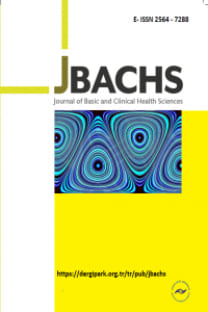Lu-177 PSMA I&T Therapy for Prostate Cancer; Treatment Response, Treatment Toxicity, and Survival Results
Öz Purpose: This study aims to evaluate the serum PSA response, Ga-68 PSMA PET/CT response, hematological/nephrological toxicity and survival results of patients with castration-resistant metastatic prostate cancer who are receiving Lu-177 PSMA therapy.Methods: The data of 57 patients with a mean age of 68 years who were treated with Lu-177 PSMA I&T were retrospectively reviewed. Secondary toxicity to treatment was determined using the criteria of the Common Toxicity Criteria for Adverse Events v5.0. The Kaplan Meier method was used for survival and progression-free survival analysis.Results: Forty percent of patients’ serum PSA values’ showed >25% regression after the first cycle of treatment. Serum PSA values were stable/regressed in 75% of the patients. While 2/57 patients showed grade 3 anemia, none showed grade 3 leukopenia or thrombocytopenia. One of 57 patient showed transient nephrotoxicity. Hematological and nephrological toxicity were not observed after treatment of eight cycles, and the serum PSA values of the patients were decreased by 97%. The mean survival time was 11.6 months in all patients, and 17.2 months in patients with serum PSA response. Progression-free survival was an average of 9.9 months.Conclusion: Providing a stable or regressed disease via single cycle treatment in 75% of patients with progression despite the treatments improving survival is an indicator of the success of the therapy. The low rate of hematological and nephrological toxicity in patients none of the patients that received eight cycles suggests that the treatment is reliable. Survival was longer in patients with serum PSA response after treatment
Anahtar Kelimeler:
PSMA, prostate cancer, radioligand therapy, mCRPC, theranostic, precision medicine
___
Mottet N, Bellmunt J, Bolla M, et al. EAU-ESTRO-SIOG Guidelines on Prostate Cancer. Part 1: Screening, Diagnosis, and Local Treatment with Curative Intent. Eur Urol 2017;71:618–629. [CrossRef]Ahmadzadehfar H, Eppard E, Kurpig S, et al. Therapeutic response and side effects of repeated radioligand therapy with 177Lu-PSMA- DKFZ-617 of castrate-resistant metastatic prostate cancer. Oncotarget 2016;7:12477–12488. [CrossRef]
Emmett L, Willowson K, Violet J, Shin J, Blanksby A, Lee J. Lutetium(177) PSMA radionuclide therapy for men with prostate cancer: a review of the current literature and discussion of practical aspects of therapy. J Med Radiat Sci 2017;64:52–60. [CrossRef]
Bernard B, Gershman B, Karnes RJ, Sweeney CJ, Vapiwala N. Approach to Oligometastatic Prostate Cancer. Am Soc Clin Oncol Educ Book 2016;36:119–129. [CrossRef]
Fendler WP, Rahbar K, Herrmann K, Kratochwil C, Eiber M. (177) Lu-PSMA Radioligand Therapy for Prostate Cancer. J Nucl Med 2017;58:1196–200. [CrossRef]
Attard G, Parker C, Eeles RA, et al. Prostate cancer. Lancet 2016;387:70– 82. [CrossRef]
Afshar-Oromieh A, Haberkorn U, Zechmann C, et al. Repeated PSMA-targeting radioligand therapy of metastatic prostate cancer with (131)I-MIP-1095. Eur J Nucl Med Mol Imaging 2017;44:950–959. [CrossRef]
Eppard E, de la Fuente A, Benesova M, et al. Clinical Translation and First In-Human Use of [(44)Sc]Sc-PSMA-617 for PET Imaging of Metastasized Castrate-Resistant Prostate Cancer. Theranostics 2017;7:4359–4369. [CrossRef]
Ahmadzadehfar H, Zimbelmann S, Yordanova A, et al. Radioligand therapy of metastatic prostate cancer using (177)Lu-PSMA-617 after radiation exposure to (223)Ra-dichloride. Oncotarget 2017;8:55567– 55574. [CrossRef]
Baum RP, Kulkarni HR, Schuchardt C, et al. 177Lu-Labeled Prostate- Specific Membrane Antigen Radioligand Therapy of Metastatic Castration-Resistant Prostate Cancer: Safety and Efficacy. J Nucl Med 2016;57:1006–1013. [CrossRef]
Kratochwil C, Giesel FL, Stefanova M, et al. PSMA-Targeted Radionuclide Therapy of Metastatic Castration-Resistant Prostate Cancer with 177Lu-Labeled PSMA-617. J Nucl Med 2016;57:1170– 1176. [CrossRef]
Rahbar K, Ahmadzadehfar H, Kratochwil C, et al. German Multicenter Study Investigating 177Lu-PSMA-617 Radioligand Therapy in Advanced Prostate Cancer Patients. J Nucl Med 2017;58:85–90. [CrossRef]
Rahbar K, Schmidt M, Heinzel A, et al. Response and Tolerability of a Single Dose of 177Lu-PSMA-617 in Patients with Metastatic Castration-Resistant Prostate Cancer: A Multicenter Retrospective Analysis. J Nucl Med 2016;57:1334–1338. [CrossRef]
Rathke H, Giesel FL, Flechsig P, et al. Repeated Lu-177-PSMA-617 radioligand therapy using treatment activities up to 9.3 GBq. J Nucl Med 2018;59:459–465. [CrossRef]
Yadav MP, Ballal S, Tripathi M, et al. (177)Lu-DKFZ-PSMA-617 therapy in metastatic castration resistant prostate cancer: safety, efficacy, and quality of life assessment. Eur J Nucl Med Mol Imaging 2017;44:81– 91. [CrossRef]
Brauer A, Grubert LS, Roll W, et al. (177)Lu-PSMA-617 radioligand therapy and outcome in patients with metastasized castration- resistant prostate cancer. Eur J Nucl Med Mol Imaging 2017;44:1663– 1670. [CrossRef]
Yordanova A, Becker A, Eppard E, et al. The impact of repeated cycles of radioligand therapy using [(177)Lu]Lu-PSMA-617 on renal function in patients with hormone refractory metastatic prostate cancer. Eur J Nucl Med Mol Imaging 2017;44:1473–1479. [CrossRef] 18. Ahmadzadehfar H, Wegen S, Yordanova A, et al. Overall survival and response pattern of castration-resistant metastatic prostate cancer to multiple cycles of radioligand therapy using [(177)Lu] Lu-PSMA-617. Eur J Nucl Med Mol Imaging 2017;44:1448–1454. [CrossRef]
Rahbar K, Bode A, Weckesser M, et al. Radioligand Therapy With 177Lu-PSMA-617 as A Novel Therapeutic Option in Patients With Metastatic Castration Resistant Prostate Cancer. Clin Nucl Med 2016;41:522–528. [CrossRef]
Kulkarni HR, Singh A, Schuchardt C, et al. PSMA-Based Radioligand Therapy for Metastatic Castration-Resistant Prostate Cancer: The Bad Berka Experience Since 2013. J Nucl Med 2016;57:97s–104s. [CrossRef]
- Yayın Aralığı: Yılda 3 Sayı
- Başlangıç: 2016
- Yayıncı: DOKUZ EYLÜL ÜNİVERSİTESİ
Sayıdaki Diğer Makaleler
Drug-Induced QT Interval Prolongation: Mechanisms, Risk Factors, Genetics and Clinical Management
Merve BİLGİÇ, Ali KARAAĞAÇ, Rıfat MUTUŞ
Emine ACAR, Burak SÖNMEZER, Erkan DEREBEK, Recep BEKİŞ, Özhan ÖZDOĞAN, Gamze Çapa KAYA
Ahmet Çağdaş ACARA, Aslı GÜLER
İbrahim H. KAYRAL, Dilek DÜLGER
Emine ACAR, Burak SÖNMEZER, Erkan DEREBEK, Recep BEKİŞ, Özhan ÖZDOĞAN, Gamze Çapa KAYA
Antimicrobial Effect of Piceatannol, a Resveratrol Metabolite, on Staphylococcus Aureus
Yasemin BAŞBINAR, Tuğba UYSAL, Nevcivan GÜLDAŞ, Hülya ELLİDOKUZ
Assessment of the Educational Content of YouTube Videos about Chest Radiograph Interpretation
